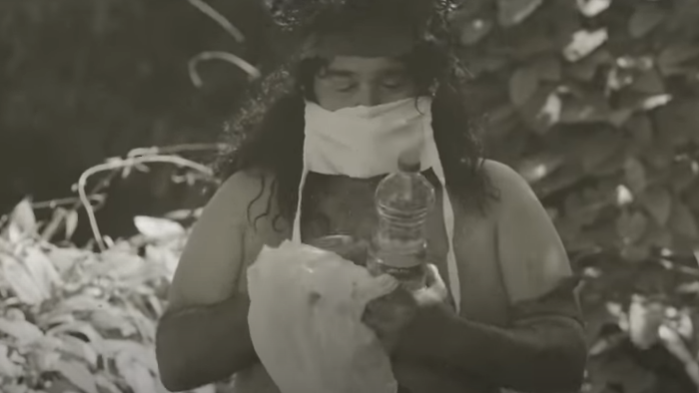
“El Tarzán de las quelas”, a musical theme interpreted by Alejandro García “Virulo” and Kelvis Ochoa to ridicule the so-called “coleros” and has led the people who gather all over Cuba in the few markets where basic necessities are sold to the outraged response from hundreds of social network users.
The song and its accompanying video, produced by the Ministry of Culture (MINCULT) and the state label EGREM, were published on November 26, 2020 and hardly circulated, but after the recent exhibition on national television, people heard of its existence.
“Virulo”, who is also the author of the song “With Cuba do not get engage”, MINCULT’s response to the San Isidro movement and the 27N collective, ironizes in the lyrics of “El Tarzán de las colas” from the anecdote that it circulated last summer of people climbing the trees near the shops since early morning to mark the queues without being noticed by the police, who banned crowds in those places.
This solution, which, among other things, is being used by people to make their purchases amid the severe shortage the island was suffering before the Covid-19 pandemic, is commented on by the letter stating that ‘there are people who are benefiting / need / if bad are the coleros / bad is the one that splashes / is bad the one that allows it / and it hurts us all “.
The song, which has been viewed a little over 3,500 times since its premiere on YouTube and up to the end of this note, 200 “I don’t like” comments and less than 100 “I like”, has drawn harsh criticism on social networks.
“This product adds to the list of clunkers through which the power in Cuba diverts attention from the problems it has caused, and stubbornly refuses to solve”, the artist Julio Llópiz-Casal noted on his Facebook wall.
“It is extremely helpful to point out that the colero’s are the culprits that so many Cubans these days barely have what to bring to their tables to eat (…) Likewise, they insist that Covid cases because people do not know whether the current Cuban economy has collapsed (as Abel Prieto told a group of young artists on December 5 last year) because of the embargo and not because of the megalithic inability of the central administration of the state To release the productive forces, the system energizes and energizes itself in passing, ”he said.
Also artist Janet Batet remarked in the publication herself: “Naturalizing the tail is already a gross and cynical deviation. Blaming the colero, more of the same: that of ‘give it to the one you didn’t give’. Distract attention Trying people to channel their genuine frustration against another victim spawned by the same system What are these sinister characters who lend themselves to such a mean game Shame on others I wonder how they can to sleep. ‘
“The worst part is that these people have lived off capitalism for many years and I doubt they queued in Cuba … they are filthy”Emphasized Sahily Borrero, referring to the years when Ochoa and “Virulo” lived in Spain and Mexico respectively.
Also artist Camila Lobón, an activist of 27N, underlined on her own wall: “It is terrible to downplay the tragedy in the service of the power it creates and at the height of their age they should not allow such awkwardness as not hypocrisy Because I doubt Let these musicians line up If they do unless they are enlightened or masochistic they would know there is no humor in hours, days, months, years of life and work wasted on bad food and bad life “.
For his part, the journalist José Raúl Gallego recalled: “When you’re going to call those who post their art or their work ‘paid’ to criticize what’s wrong in Cuba, remember that this ‘anthem against coleros’ and other similar topics are sponsored (paid for) by the Ministry of Cultuur., The Music Institute and EGREEM (public money, all of us) “.
The song’s video has gone viral as the official media, MINCULT, UNEAC and Miguel Díaz-Canel himself, and other officials, attack the ‘Homeland and Life’ issue, which former Culture Minister Abel Prieto described as’ a musical pamphlet “and” a strategy linked to the change of mandate in the United States and the fear of Florida’s most extreme groups of a transformation in bilateral politics. “